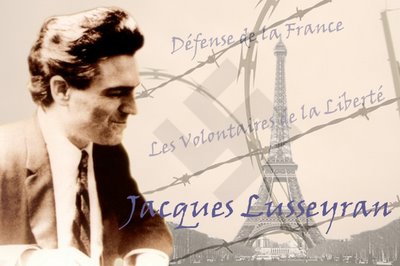
Jacques Lusseyran.
At least a couple years ago, my brother-in-law Paul Merchant loaned me a book: And There Was Light, by Jacques Lusseyran. Sadly, the book sat on my shelf until just a few days ago, and once I started reading, I regretted waiting so long. This book is life changing.
In summary, Jacques Lusseyran was a Frenchman who went blind from an early age and learned other, perhaps more important ways of seeing the world. By the age of seventeen he banded with a small group of students to oppose the Nazi occupation of Paris and personally interviewed potential candidates for the resistence. He rose to a place of prominance in the underground movement, first in Les Volontaires de la Liberté and then in Défense de la France; but he was later betrayed, arrested, and sent to Buchenwald.
The story of courage is remarkable enough, but more importantly, Lusseyran reveals an inner vision of love, life, and light. For example, when his companions tended toward excessive nationalism, he said, "God is neither a German nor a Russian nor Frenchman. God is life, and everything that does violence to life is against God." Much later, in the prisons of Paris and the German death camps, he tapped into a rare source of forgiveness and joy. He said, "There is forgiveness for every misery. And as misery grows, forgiveness grows along with it."
The whole account from start to finish can be summarized as follows: "The first [truth] is that joy does not come from outside, for whatever happens to us it is within. The second truth is that light does not come to us from without. Light is in us, even if we have no eyes."
What impressed me most about this book was Lusseyran's courage and deep spiritual insight in the face of absolute terror and unthinkable atrocities. Nothing in my life compares to the destruction of World War II, but I have also known pain and loss. Lusseyran embodies a quote I once heard from the LDS Apostle Neal A. Maxwell when he said Christ "went meekly forward and partook of the most bitter cup--and did so without becoming bitter!" In fact, my therapist once read that quote to me as I faced the loss of my foster sons and other personal challenges. Can I say the same? Can I say I have partaken of my bitter cup and at once did not become bitter? There is freedom in releasing bitterness and anger.
My uncle Pat says everything happens for a reason, and if so, I have to believe this book came into my life at this time because God is teaching me lessons in forgiveness, acceptance, and light, even when the world falls apart all around me.
No comments:
Post a Comment